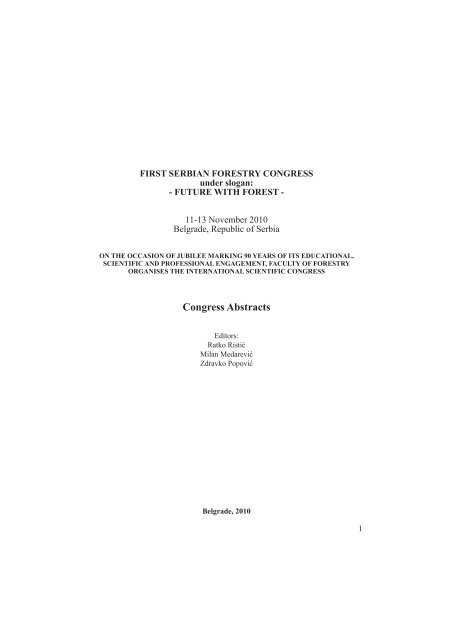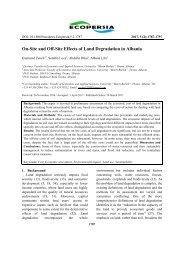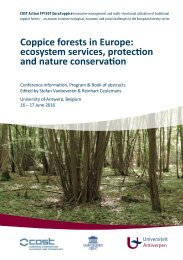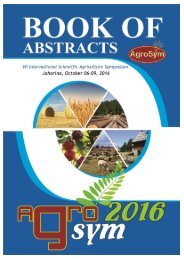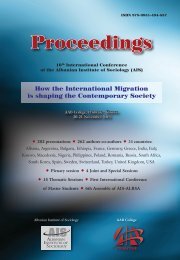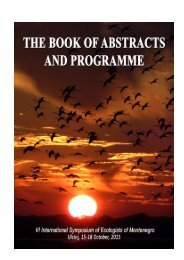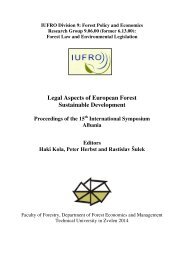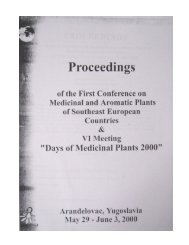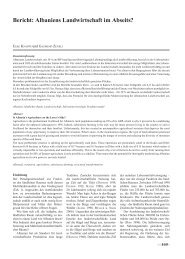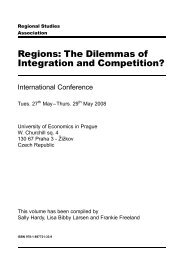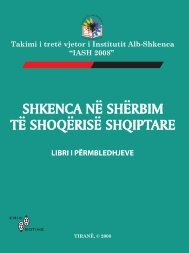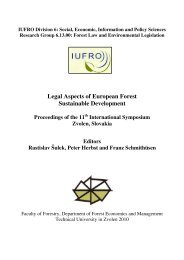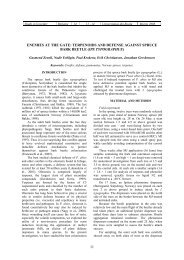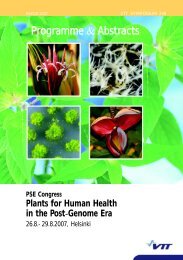Conference Belgrade-2010
You also want an ePaper? Increase the reach of your titles
YUMPU automatically turns print PDFs into web optimized ePapers that Google loves.
FIRST SERBIAN FORESTRY CONGRESS<br />
under slogan:<br />
- FUTURE WITH FOREST -<br />
11-13 November <strong>2010</strong><br />
<strong>Belgrade</strong>, Republic of Serbia<br />
ON THE OCCASION OF JUBILEE MARKING 90 YEARS OF ITS EDUCATIONAL,<br />
SCIENTIFIC AND PROFESSIONAL ENGAGEMENT, FACULTY OF FORESTRY<br />
ORGANISES THE INTERNATIONAL SCIENTIFIC CONGRESS<br />
Congress Abstracts<br />
Editors:<br />
Ratko Ristić<br />
Milan Medarević<br />
Zdravko Popović<br />
<strong>Belgrade</strong>, <strong>2010</strong><br />
1
FIRST SERBIAN FORESTRY CONGRESS<br />
under slogan:<br />
- FUTURE WITH FOREST -<br />
11-13 November <strong>2010</strong>:<br />
<strong>Belgrade</strong>, Republic of Serbia<br />
Congress Abstract<br />
Publisher:<br />
Editors:<br />
Organiser:<br />
Co-organisers:<br />
Congress is<br />
supported by:<br />
University of <strong>Belgrade</strong>, Faculty of Forestry<br />
Ratko Ristić<br />
Milan Medarević<br />
Zdravko Popović<br />
University of <strong>Belgrade</strong>, Faculty of Forestry, <strong>Belgrade</strong><br />
Institute for Nature Conservation of Serbia<br />
Serbian Ministry of Science and Technological Development<br />
The International Union of Forest Research Organizations (IUFRO)<br />
World Association for Soil and Water Conservation (WASWC)<br />
International Federation for Landscape Architecture (EFLA)<br />
International Organization for Biological Control of Noxious Animals<br />
and Plants – Palaearctic Regional Section<br />
WITASEK, Austria<br />
Editorial Office: University of <strong>Belgrade</strong>, Faculty of Forestry, Kneza Višeslava 1, 11030<br />
<strong>Belgrade</strong><br />
Telephones: +381 11 3053 988, +381 11 3053 871,<br />
Fax: +381 11 2 545 485<br />
E-mail: conference.office@sfb.rs<br />
Home page: http://www.sfb.rs<br />
Lecture:<br />
Cover design:<br />
Katarina Lazić<br />
Boris Radić<br />
Technical Editor: Saša Sofijanić<br />
Circulation:<br />
Printing:<br />
300 copies<br />
Planeta print, <strong>Belgrade</strong><br />
ISBN: 978-86-7299-066-9<br />
2
First Serbian Forestry Congress - Future with Forests -<br />
Topic A - Forestry<br />
POTENTIAL OF BIOMASS AND WAYS OF USING<br />
IT IN THE DISTRICT OF DIBRA<br />
Malvina Shehi 1 , Gazmend zeneli 1<br />
vinashehi@yahoo.com<br />
1<br />
Faculty of Forestry sciences, Agriculture University of Tirana – Albania<br />
Abstract: With increasing concern about energy security and greenhouse gas emissions,<br />
growing attention has been drawn to wood biomass as one of the potential bioenergy<br />
sources. One of the potential bioenergy sources is wood biomass from either conventional<br />
forests or energy plantations. This paper reviews the current situation of wood biomass<br />
energy development in the region of Dibra (Albania), particularly on its relationship to<br />
sustainable development. It points out that the forest in the regions could provide considerable<br />
amounts of biomass coming as residues from forest harvesting or from silvicultural<br />
treatment. The analysis shows that the rising fuelwood demand in the “wood-for-energy”<br />
scenario would clearly lead to a much stronger competition for small roundwood (pulpwood)<br />
and sawmill residues. This competition would increase pulpwood prices and — to<br />
some extent — forest product prices (especially sawmill residues and pulp). Forestry can<br />
play a vital role in bringing additional benefits via land care and rural investment which<br />
would help the establishment of new regional industries based on new plantations. Unused<br />
agricultural land together with abandoned land presents a great opportunity for the<br />
establishment of Short rotation Forest (SrF) plantations producing higher biomass and<br />
offering several inherent environmental benefits unavailable with annual crops. In addition,<br />
the harvesting of forest fuels can be a driving force for improved forest management,<br />
and thus enhancement of the overall economy of forest industries. The development of<br />
biomass-based district heating and the sustainability of bio-fuel supply will require more<br />
fuel directly from forests, but might lead to a better management of communal forest.<br />
Key words: Albania, biomass, forest residue, short-rotation plantation, “wood-for-energy”<br />
scenario<br />
143
First Serbian Forestry Congress - Future with Forests -<br />
Topic A - Forestry<br />
CAPACITY DEVELOPMENT IN ALBANIAN FORESTRY: MARKET AC-<br />
TORS, TRENDS, REGULATORS, AND ENABLING ENVIRONMENT<br />
Gazmend zeneli 1 , Abdulla Diku 2<br />
gzeneli2000@yahoo.de<br />
1<br />
Faculty of Forestry Sciences, Agriculture University of Tirana - Albania<br />
2<br />
DIAvA Consulting, P.O. box 228/1, 1800 Tirana - Albania<br />
Abstract: Capacity building (Cb) in Albanian forestry has been a highly donor orchestrated<br />
market where donors have moved in and phased out according to their development<br />
policies or agendas. In almost 20 years of market liberalization many donors’ funding and<br />
development agendas have shaped the Cb market in Albania in terms of legal constitution,<br />
areas of expertise, technical specialization and network. This paper is an attempt<br />
to shed light on the current situation on capacity development level of forestry sector,<br />
market trend, policies collaboration and also the current state of the demand in Albania<br />
and analyzes market actors’ decision criteria related to engagement in forestry projects<br />
that provide environmental services. In a questionnaire survey, experts representing key<br />
market actor groups, were asked to name and weight factors influencing the selections<br />
of Cb services; ways through which are determined the needs for Cb; factors or players<br />
that affect choice of opportunities available for Cb; factors determining the quality<br />
of services; the main ways to market services and the factors that determine the quality<br />
of services; and the need to enable the service providers to provide (quality) service to<br />
contribute to the forestry sectors, amongst other. The method for this survey and analysis<br />
for a large part is based on the approach called comprehensive market survey, analyzing<br />
both individual suppliers and demanders of services. The survey provides preliminary<br />
insights into bottom-up defined decision criteria relevant for key-actors in the market of<br />
Albanian forestry-based environmental services, and compiles information for further<br />
multi-criteria based assessments of forestry projects providing Capacity Development for<br />
environmental services. The survey identifies strength, weakness, opportunities, threats<br />
and obstacles of service provision process considering all related factors and indicators.<br />
We hypothesize that the development of markets for these environmental services will<br />
substantially depend on compliance with requirements of key market actors representing<br />
supply and demand sides.<br />
Key words: Albania, Capacity development, forestry, market actors, suppliers, valueadded<br />
chain<br />
167


